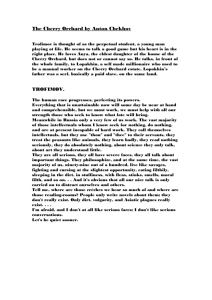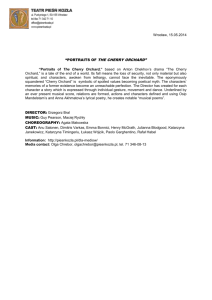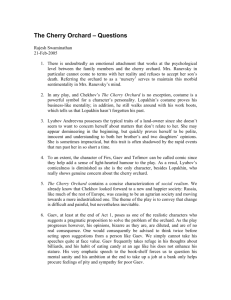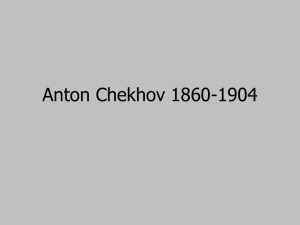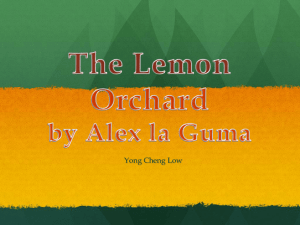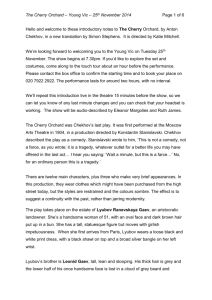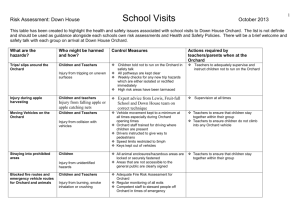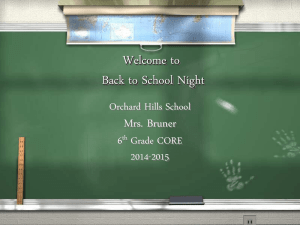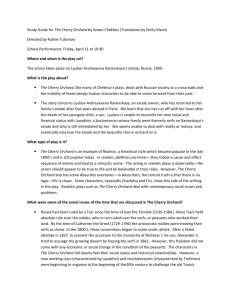The Cherry Orchard (Comedy, 1903) by Anton Chekhov
advertisement
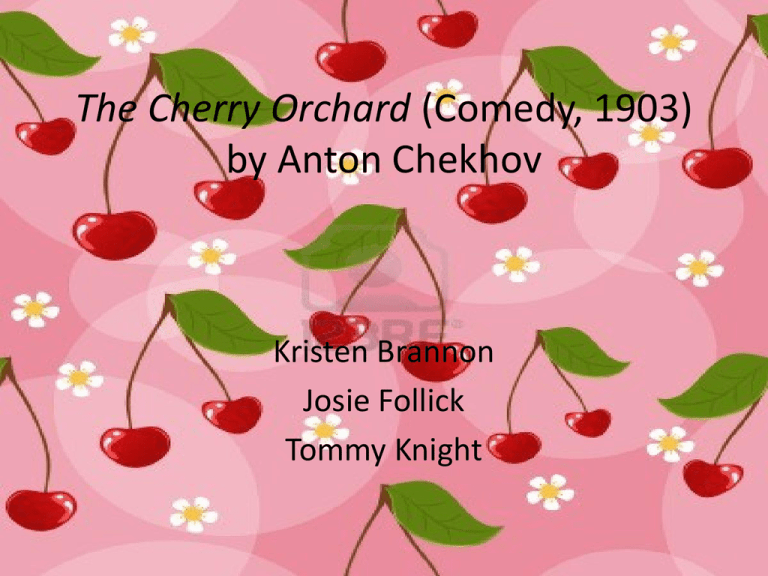
The Cherry Orchard (Comedy, 1903) by Anton Chekhov Kristen Brannon Josie Follick Tommy Knight Family Relationships (Drawing credit to Josie Follick) Plot- Act 1 Madame Ranevsky arrives from her five-year visit to Paris back to her Orchard home in Russia along with Anya, her biological daughter, Anya’s governess Charlotte, and Yasha, her manservant. She is discovered to be very poor as opposed to before she departed to Paris. The three arrive at their orchard home to find Yermolai Lopakhin, a used-to-be-peasant, Ranevsky’s brother, Leonid Gayev, a co-owner of the orchard, Ranevsky’s adopted daughter, Varya, Firs, a very old servant, and two other servants, Yephikodov, and Dunyasha. Varya then says that because the family can no longer afford the Cherry Orchard, it is going to be sold on the 22nd of August. This creates mixed opinions in all of the characters. Lopakhin then suggests Ranevsky rent out parcels of the land to build villas upon. She is taken aback. Peter Trofimov, Grisha’s former tutor (Ranevsky’s deceased son) arrives and brings up bad memories. Plot- Act 2 At the beginning of the second act, the three servants Dunyasha, Yasha, and Yephikodov reveal their affections for one another. Yephikodov loves Dunyasha and Dunyasha loves Yasha. Yasha, unfortunately has no affinity for anyone but himself. After that is revealed, Lopakhin and the rest of the crew come back and argue over the orchard more. This leaves Ranevsky saddened by the thought of her orchard being gone and upset at Lopakhin. Plot- Act 3 In the Third Act, Ranevsky hosts a party for the sale of the orchard. People from all walks of life are invited from lower middle to upper class. During the party, Lopakhin is absent and this fact worries Ranevsky to the point where she fights with her brother. Gayev and Ranevsky are fuming as Lopakhin arrives stating he has bought the orchard and intends to “ruin” it in Ranevsky’s eyes. She is devastated. Plot- Act 4 The fourth act is essentially the resolution and falling action. Everyone goes their own separate ways and finds new things to involve themselves with. In the hustle and bustle, Firs, the old manservant, is left behind, locked out of the little orchard home. He has taken ill and the the play implies that he dies there. Inciting Incident Varya: “The property will be sold in August,” Climax Ranevsky: “Was the Cherry Orchard sold?” Lopakhin: “Yes.” Ranevsky: “Who bought it?” Lopakhin: “I did.” Major Issues • Money is important yet futile. • All things beloved eventually pass. • Memory is the cornerstone of emotion. Theme Social class does not define how one acts or responds to situations, nor does it define one’s life-worth. Two most important characters The protagonist, Madame Lyuba Andreyevna Ranevsky and the antagonist, Yermolai Alexeyitch Lopakhin are the two most important characters in the play because without them, the plot could not progress. Lopakhin once was a peasant and through the kindness of others rose his way through the social hierarchy and is now a wealthy businessman. Madame Ranevsky once reveled in the wealth of the cherry orchard but has worked her way down to a lower middle class social status due to her frivolous ways in Paris. Because of their respective ages, Lopakhin lives in the now and does all he can to be as successful as he can. Ranevsky lives life with a finger on the past; appreciating all the past has given her and is all together a very nostalgic character. Protagonist Madame Ranevsky is the protagonist. She represents the will of the masses; not selling the cherry orchard. She has too much emotional attachment to let it go and we as readers or viewers sympathize with her. Antagonist The antagonist is Yermolai Lopakhin. He is the stereotypical cold-hearted, yet light-hearted businessman. We as readers or viewers don’t like him because he has no regard for any emotional attachment the other characters might have to the orchard. He is only seeking self-interest. Setting The play is set in Imperial Russia in the very late 19th Century. The action takes place entirely on the estate of Lyuba Ranevsky. The plot begins in May and continues to early September. During this time in history, Russia is still ruled by Tsars. Serfdom was only just abolished in 1861. The aristocratic life that was once found on the estate is changing. The aristocrats, the former serfs, and the new generations that are taking their places are all witnessing this transformation. (Some suggest the Ukraine as a more specific setting for this drama. Chekhov lived there for much of his life.) Possible monologues and scenes for competition and audition purposes • Act I (scene) from Anya’s exit to Gaev’s line ”What gibberish” pg. 7-9 • Act I (scene) from Anya’s reentering to the end of the act. Pg. 14-16 • Act I (monologue, m.) Lopakhin “I want to say something very pleasant…” pg. 16 • Act I (monologue, f.) Varya “It’s time to go to sleep…” pg. 15 • Act I (monologue, m.) Gaev “Yes…It’s the real thing.” (cupboard) pg. 16 • Act I (monologue, f.) Lyuba “Oh, my childhood…” pg. 11 (cont’d…) • Act II (monologue, f.) Charlotta “I haven’t a real passport…” pg. 17 • Act II (monologue, f.) Lyubov “Oh, the sins…” pg. 21 • Act II (monologue, m.) Trofimov “Mankind marches forward…” pg. 24 • Act II (scene) Trofimov and Anya at the end of the Act. Pg. 26-27 (cont’d…) • Act III (scene) Lyubov and Trofimov from “don’t tease her, Peter…” to “Peter, wait…” pg. 31-33 • Act III (monologue, m.) Lopakhin “I bought it…” pg. 38 • Act III (monologue, f.) Anya “Mother…” pg. 39 • Act IV (monologue, m.) Firs - Last lines of play. pg. 49 Vocabulary • • • • • • • • • • • • Kvass – homemade beer Villa – summer vacation home Mentone – City on the French Mediterranean Billiards – A game involving hitting balls on a felted table-top with cue sticks Patchouli – a perfume Dessiatin – area equivalent to 2.7 acres Shrine – a chapel Passport – referring specifically to the identification papers needed to travel within Russia. Creches – public nurseries Serf – servant or slave that’s bound to the land by the aristocracy to work it Freeholders – small farmers Ruble – the basic unit of currency in Russia; equal to 100 kopeks References- Act 1 • “Little man” – Lopakhin says this several times in quoting how Lyuba addresses him; with inferiority as though still a serf. • “Encyclopaedic Dictionary” – Gaev claims that the Orchard is so well known that it is in this book. Possibly Chekov alludes to the 86-volume publication by Brockhaus and Efron. • “I’m a man of the eighties” – Gaev says this about himself, implying that he witnessed the anti-reform and anti-liberal actions of then Tsar Alexander III, and that he’s enlightened and knows how to treat serfs well. References- Act 2 • Epikhdov asks Dunyasha if she is familiar with the materialist and freethinker Henry Buckle. He demonstrates his education. • “My brother, my suffering brother…” by Nadson, and “Come out on the Volga” by Nekrason are both quoted by the tramp. Both of these poets were born of wealth and wrote about the slaves and laborers. The tramp is wretched and represents a by-product of the “good life”. • “Oh, feel me, get thee to a nunnery,” and “Oh, nymph, remember me in thine orisons” are both allusions to Hamlet. Hamlet says both of these lines to Ophelia. In this play, Lopakhin says them to Lyuba and Gaev. As Hamlet accuses Ophelia of immodesty, so too does Lopakhin towards the aristocrats. Would we recommend this to a friend? • The Cherry Orchard is a very complex drama with innumerable themes. Its uniqueness was quite fascinating. The action is written with no stops during acts and it moves very quickly. The characters’ names being Russian as well as there being many variations of the names complicates the play and makes it even harder to read. However, the difficulty of the play, though discouraging, makes the play more appealing to some. We would recommend this play to a friend.
